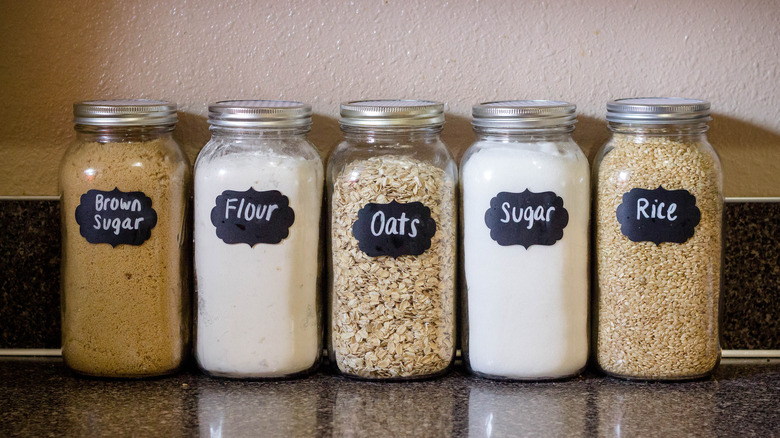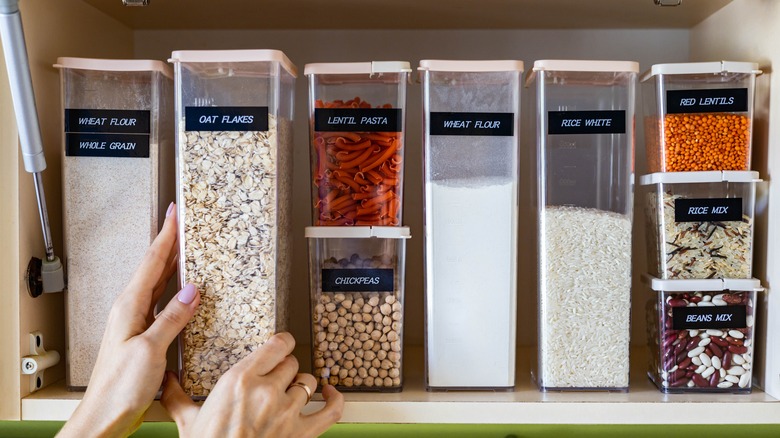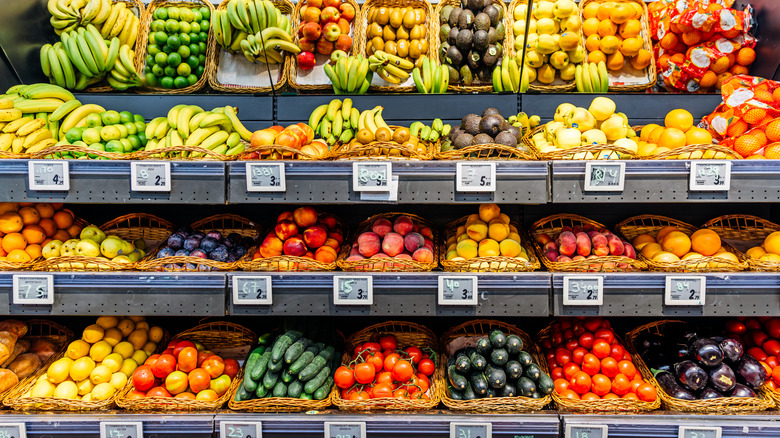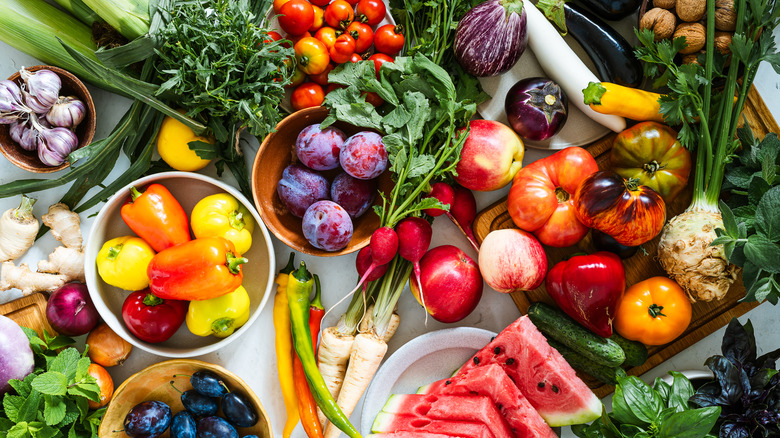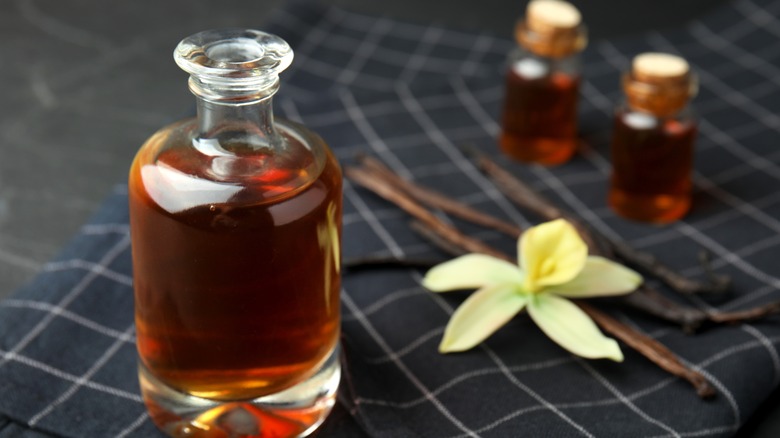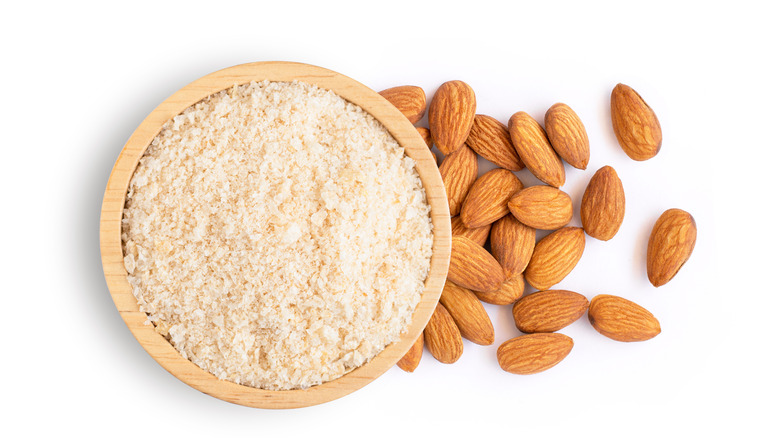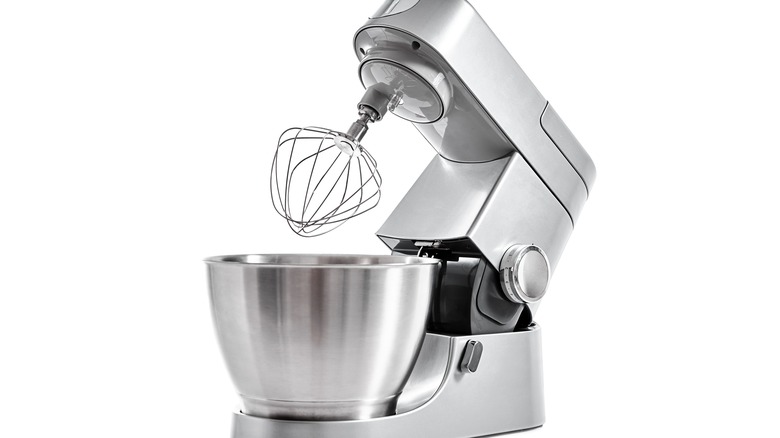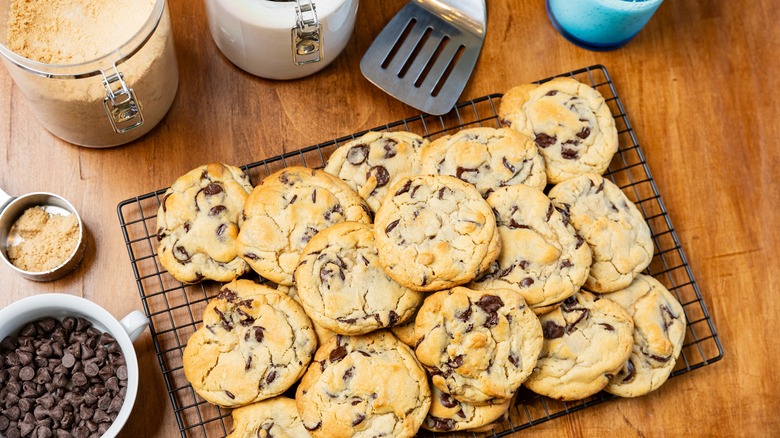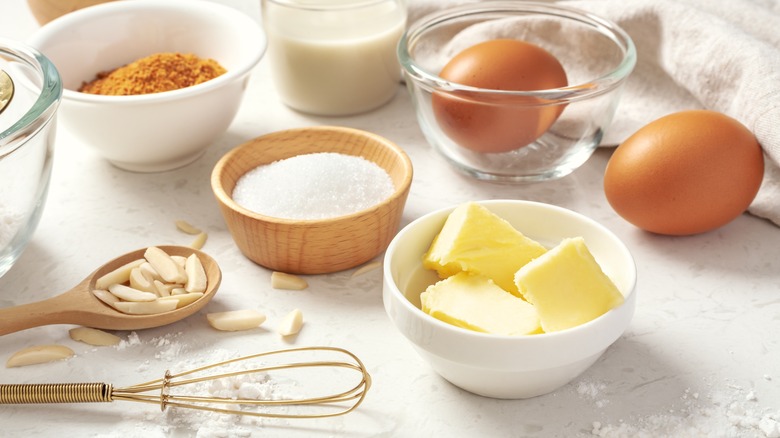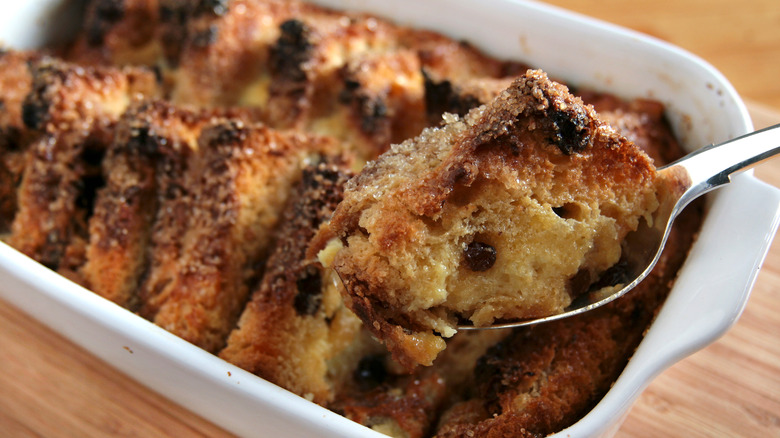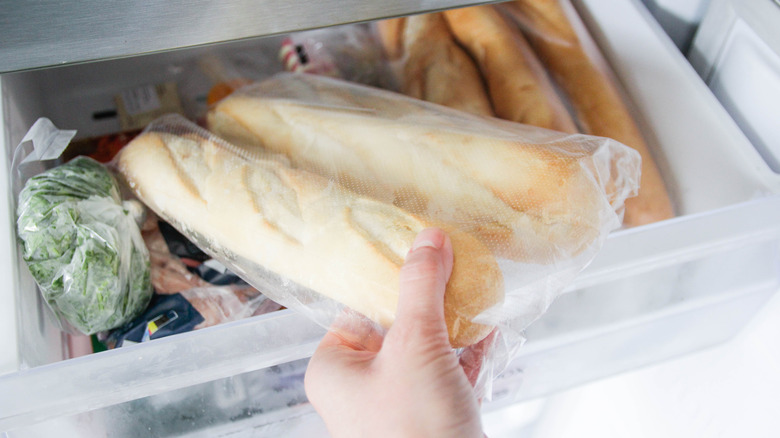11 Money-Saving Tips For Impressive Baking On A Budget
If you are a keen baker, you will know there is so much joy in taking a freshly baked pastry from the oven and savoring the sweet aroma. You will also be aware of how expensive of a hobby it can be, as the price of pantry staples, kitchen equipment, and specialty ingredients can add up. Baking on a budget can be a challenge, and it can be hard to know where to sacrifice quality without ruining your dish.
To help you navigate the waters of low-cost baking, Chowhound has spoken to two experts to get their views on how best to cut costs in the kitchen: Becky Harding, founder and recipe developer at The Cookie Rookie, and Holly Nilsson, founder of Spend with Pennies and author of the cookbook "Everyday Comfort." Both shared their top tips for budget baking based on their years of experience.
Whether you are a seasoned baker and are trying to cut back on costs, or setting up your kitchen for baking for the first time, this valuable insider knowledge will help you save money without sacrificing the quality of your baked goods. So grab your apron and let's dive into 11 money-saving tips for baking on a budget.
Buy in bulk
Baking as a hobby can turn into an expensive endeavor, but with a little planning, you can bring the costs down to a more manageable level. There are many ingredients that you will turn to time and again, such as eggs, flour, and chocolate chips, and buying them in bulk is usually much cheaper.
"Buying in bulk can be a game-changer for budget-conscious bakers," Becky Harding said. "You often get a better price per unit when purchasing larger quantities of staples like flour, sugar, and chocolate chips."
Before you rush out to fill your pantry to the brim, however, it is important to make sure you will actually be saving money in the long run. "It's always a good idea to check the price per ounce or per 100 grams to ensure that it's actually less expensive in bulk," Holly Nilsson advised. "Sometimes if the savings are very minimal, I prefer to purchase in smaller quantities to keep things fresh, especially for items that are bulky for storage."
Harding has an extra tip to ensure any milk you buy in bulk stays as fresh as possible. "Add salt to your milk [after] opening to act as a preservative to stop bacteria from growing," she said. "Give it a good shake and refrigerate immediately."
Invest in good quality airtight containers
Once you have bought your staples in bulk, it is crucial that you find the best way to keep them fresh. There is no point in getting a great price on your stash of flour, only to throw it out a few months down the line as it is looking past its best.
"For most ingredients, the best way to keep them fresh is to invest in quality airtight containers for storage and store [them] away from heat and light," Holly Nilsson said. "Be sure to mark expiration dates or the date you opened the ingredient on the container. I use a sharpie which can be removed from most smooth containers — glass or plastic — with hand sanitizer or rubbing alcohol."
Becky Harding agrees, and warns about keeping an eye on when the product is due to expire. "It's crucial to consider expiry dates of products and have adequate storage space to prevent spoilage, as you don't want to throw ingredients away," she said. "Proper airtight containers and a cool, dark pantry are essential."
She also has a handy tip for keeping eggs as fresh as possible, especially if you have bought them in bulk. "Eggs have a natural protective coating called the bloom that keeps moisture in and bacteria out, but this can be lost in the cleaning and packaging process," she explains. "Coating eggs in vegetable oil can help recreate the barrier and extend shelf life."
Buy ingredients when they are on sale
Just because you're baking on a budget doesn't mean you can only buy the lowest quality products available. Keep an eye out for special-price items and snag them when you can, freezing them if necessary until you will use them.
"If possible, plan your baking in advance so you can watch for sales," Holly Nilsson suggests, noting that the holiday time is great for this. "It's the perfect time to stock up on ingredients if they'll keep. Butter freezes beautifully if you find a great sale, as do most pies, cookies, and cakes."
Becky Harding also recommends the pre-planning method for its money-saving benefits. "Plan your baking to avoid impulse purchases and save money," she said. "Keep an eye out for sales on ingredients and adjust your baking schedule accordingly."
Whether it is ingredients that are reduced due to the seasonality or fresh produce that is close to its expiry date, there are plenty of deals to be found if you hunt for them, and have appropriate storage to keep them fresh. So keep your eyes peeled every time you head to the store — you may just pick up an exciting bargain.
Use seasonal ingredients
To enjoy fresh produce at its tastiest and least expensive, buy foods that are in season whenever possible. In-season foods are more widely available in your local area and don't have to be imported, meaning lower costs and less environmental impact as a bonus.
"Seasonal fruits and vegetables are typically cheaper and often tastier," Becky Harding pointed out. "Incorporate them into your baking whenever possible. For example, use fresh berries in summer for pies and crumbles, and apples and pears in autumn for cakes and muffins. You can also freeze or preserve excess produce to enjoy throughout the year."
A great way to support your community while you stock up on delicious vibrant produce is to visit a nearby farm or your local farmers market. "I am lucky enough to live in a location where I can often buy fruit direct from growers or visit U-Pick farms to pick my own berries," Holly Nilsson said. "Seasonal ingredients can also be stored for later. Fresh fruit, berries, and zucchini are plentiful and less expensive in the summer but they freeze well for desserts all year long."
Once again, holidays can also prove to be a prime time to stock up. "I also watch for sales after holidays for things that freeze well like bags of cranberries after Thanksgiving or quality chocolate after Valentine's Day," Nilsson said.
Make your own 'essentials'
Extracts and spice mixes often come with a hefty price tag, but the good news is, with a little planning, you can make your own versions at a reduced price. "You can save money by preparing things at home, like homemade vanilla extract — plan ahead, it takes several months to steep — or homemade caramel sauce in place of store-bought," Holly Nilsson said. "The bonus is that the flavor of homemade is usually superior!"
Boxes of premixed spices can give a false sense of saving money since you likely already have all of the ingredients separately in your spice rack. With a little effort, you can create the same flavor without the expense. "I love making my own homemade versions of things like biscuit mix or spice blends for baking," Nilsson said. "Blends like pumpkin pie spice, apple pie spice, and even cinnamon sugar are much cheaper made at home. Plus, I can make smaller quantities meaning that the spices are fresher and have more flavor."
Becky Harding is also an advocate for creating your own extracts at home, pointing out that a homemade vanilla extract made from just vanilla beans and vodka can keep for up to five years. The next time you run out of a pantry essential, why not save yourself some money and experiment with making your own?
Find low-cost alternatives to expensive ingredients
Specialty ingredients can be fun to shop for when you're baking a new recipe, but some of them come with a pretty hefty price tag. While the occasional splurge on a premium item won't cause too many issues, it can be important to find lower-cost replacements for ingredients that you may use more often.
"There are certainly many high-price ingredients that can be substituted but it can depend on the application," Holly Nilsson explained. "For example, artificial vanilla extract is a great substitution in baking since pure vanilla extract can be quite pricey." You'll want to make sure that the ingredient you are substituting is more of a supporting character in your recipe, though. If it has a starring role in the dish, Nilsson said that you may want to go with the real thing.
Becky Harding also has some suggestions for how to switch out high-price ingredients for cheaper substitutes that will still work well. "Almond flour can be replaced with a blend of oat flour and coconut flour for a fraction of the cost," she said. "Pure maple syrup can be swapped for a combination of honey and brown sugar. And while high-quality cocoa powder is ideal, natural unsweetened cocoa can often deliver great results at a lower price."
Invest in a few quality baking tools
In general, buying lower-priced items is the best way to save money when baking, but occasionally, investing in a more expensive piece of equipment can pay off in the long term, especially if it is a multipurpose tool. "Investing in a good stand mixer or food processor can be a game-changer," Becky Harding said. "These tools can handle a variety of tasks, from mixing dough to chopping nuts and grating cheese. While they might have a higher upfront cost, they can save time and effort in the long run, and you'll likely use them for other culinary endeavors as well."
For smaller tasks, a handheld option may be more suitable, and can still handle a variety of kitchen tasks. "An immersion blender is great to have on hand and there are many that have different attachments such as a chopper, a whisk, and even a mini food processor," Holly Nilsson said. "This costs less than buying each separately, plus it saves on space and time too."
Nilsson also suggested spending a bit more on everyday essentials such as pans and baking trays, as they will last longer than cheaper ones and give you better results. "I also recommend using an oven thermometer to ensure your oven is at the correct temperature," she said. "These investments will result in better baked goods and less wasted ingredients."
Batch-bake to save time and money
One key tip that will not only save you money but give you back some precious time is to batch bake. Rather than baking every few days, try making double or triple the quantities at once and storing them until needed.
"Baking in larger batches can indeed save money, especially when considering energy costs," Becky Harding said. "You're essentially using the same amount of energy to bake one loaf of bread as you would to bake two. Plus, it saves time in the long run."
By combining batch baking with some of the other tips in our list, you can save considerable money, in addition to making sure you always have some baked treats available when you need them. "You can freeze most baked goods like cookies or dinner rolls so you'll have them on hand instead of purchasing them at the grocery store," Holly Nilsson said. Just make sure you have enough room in the freezer before you quadruple the quantities. You wouldn't want to have to eat all the pastries in one go because there is nowhere to store them!
Make recipes that use budget baking staples
While it may be tempting to make a different dessert every few days with a range of ingredients, to keep your costs low, the key is to use what you already have. Many recipes can be made with kitchen staples plus a couple of extras. "There are plenty of budget-friendly baking heroes!" Becky Harding said. "Plain flour, sugar, and eggs are the backbone of many recipes. Unsalted butter is often more versatile than salted and can be cheaper, and dried fruits like raisins and cranberries are affordable options to add flavor and texture."
Holly Nilsson agrees, but pointed out that with certain items, the more expensive brand can be worth the price. "It can be worth splurging on ingredients like chocolate or butter as premium brands tend to have fewer additives and a superior flavor or texture," she said. "That being said, don't be swayed by a higher price tag alone — if you love a particular brand, don't feel the need to look elsewhere."
Harding also recommended that when making a fruity dessert, you don't always need to buy fresh. Canned and frozen fruits make a great substitute if a fruit is out of season or simply too expensive. The advantage is that they can be kept in the freezer or pantry long term, ready to be put to use when you need them.
Repurpose leftovers
Just because you are sticking to a strict budget doesn't mean you have to miss out on baking delicious treats. Using leftovers from other meals is an ideal way to save the pennies, and will reduce food waste at the same time. "Get creative by repurposing leftovers, such as turning stale bread into bread pudding or croutons," Becky Harding said.
Bread pudding is the classic leftover dessert, and is an indulgent treat that will certainly not make you feel like you're missing out. Bananas are another popular option to repurpose since overly brown ones can quickly be made into banana bread.
Any other fruit that you find neglected at the back of the fridge can be easily turned into a compote or a filling for a pie or crumble. With a little creativity, you can whip up some simple baked treats using ingredients that were originally bought for another dish.
Use the freezer
In your efforts to bake on a low budget, your freezer is going to be a crucial ally. Whether it is to store foods that you have bought in bulk or prevent the leftover pie from going bad (in the unlikely scenario that there is any left), using the freezer properly is an essential step in the money-saving process. "This will prevent waste from buying and baking in bulk," Becky Harding said. "For perishable items like fresh fruit, consider freezing or dehydrating to extend their shelf life."
As well as the obvious ingredients that we are all used to freezing, Holly Nilsson said you can also freeze pantry staples and extend their shelf life. "Many items, including excess flour and nuts, can be stored in the freezer if you have space," she noted.
The key to making the most of your freezer is to keep it as organized as possible. Store ingredients in uniform plastic or glass tubs when you can, as these are much easier to stack. Irregular-shaped packaging can be awkward to store and takes up unnecessary space. Freezer bags are another great way to save on space, allowing you to store your baked goods such as cookies as flat as possible. Sealing your food properly will also preserve the quality, preventing you from needing to throw anything out further down the line.

